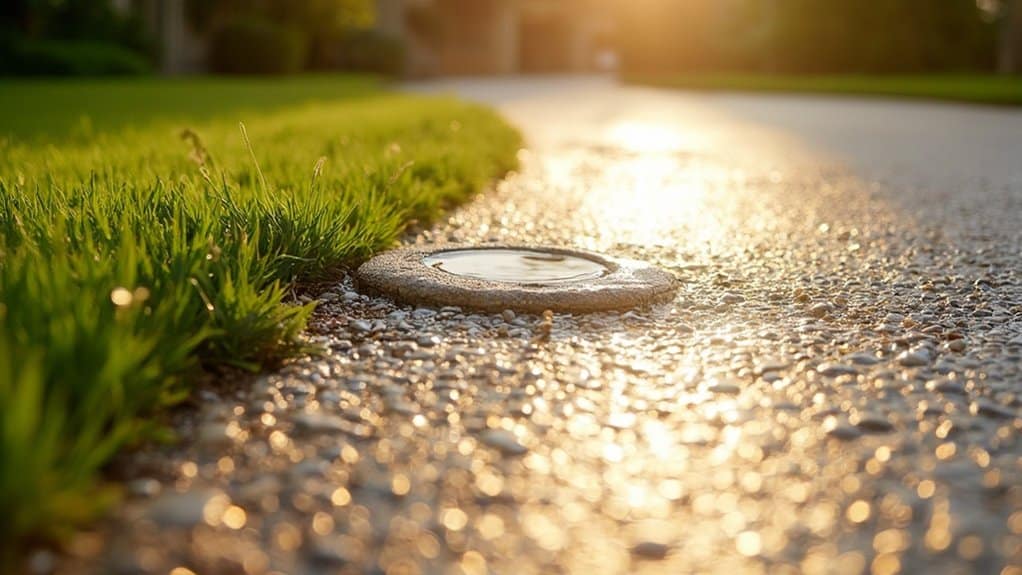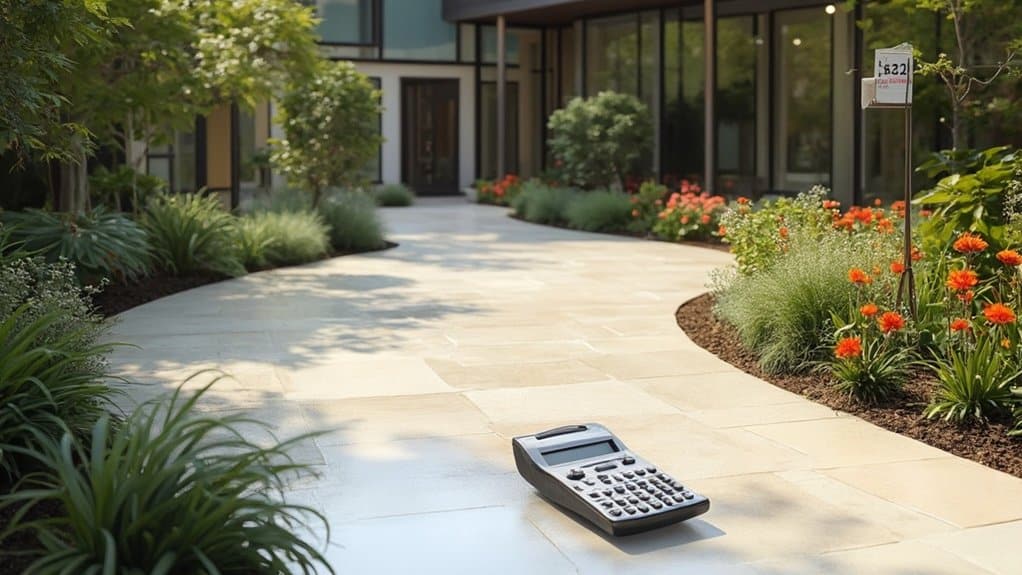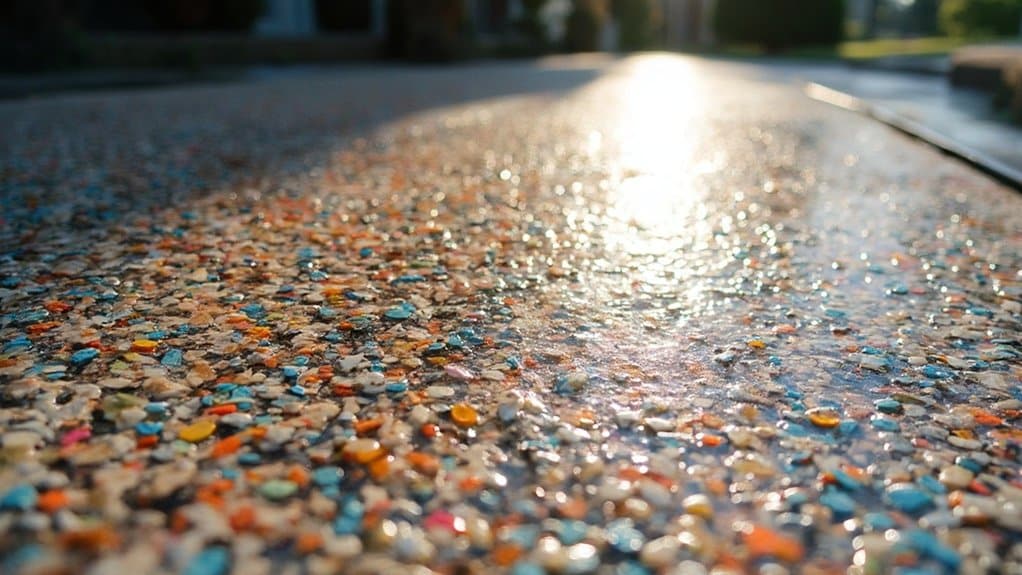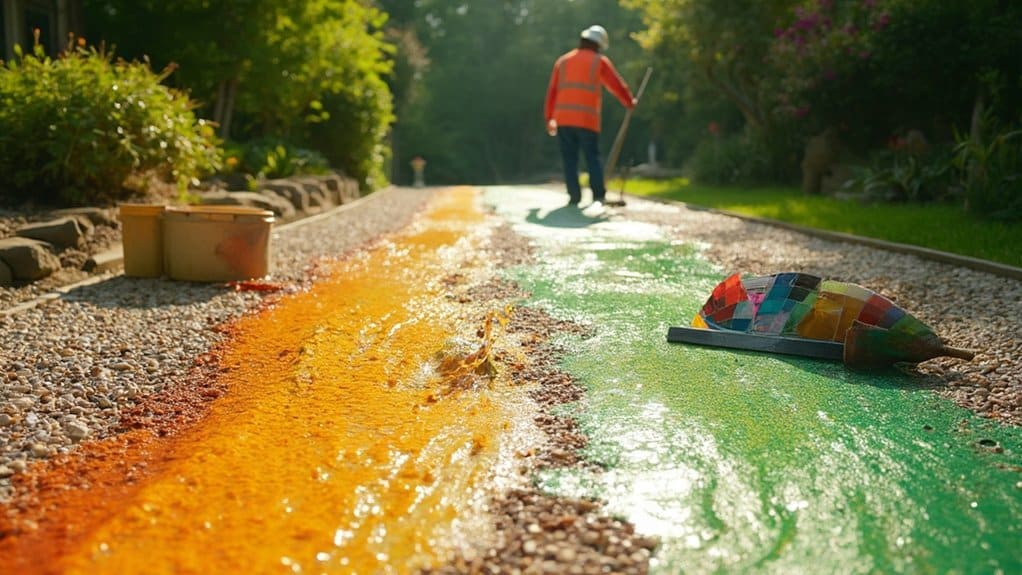Yes, a resin driveway is permeable, allowing rainwater to pass through its porous surface. This feature helps reduce runoff and manage stormwater effectively, making it an eco-friendly choice. Resin driveways also promote groundwater recharge and filter out pollutants, benefiting local ecosystems. They require minimal maintenance and have a long lifespan, offering cost savings in the long run. Additionally, they help mitigate urban heat islands, which is another environmental advantage. Discover more about the benefits and installation aspects of resin driveways.
Table of Contents
ToggleKey Takeaways
Yes, resin driveways can be permeable, allowing rainwater to soak through and reducing urban runoff and flood risks. They work well with Sustainable Urban Drainage Systems (SUDS), helping to recharge groundwater and address local drainage issues.
In addition, resin driveways filter out pollutants, which significantly reduces suspended solids and contributes to a cleaner environment. Their eco-friendly materials and permeability not only enhance property value but also lower long-term maintenance and repair costs.
Furthermore, by mitigating the urban heat island effect, resin driveways help keep urban areas cooler and support local ecosystems.
Understanding Resin Driveways: An Overview
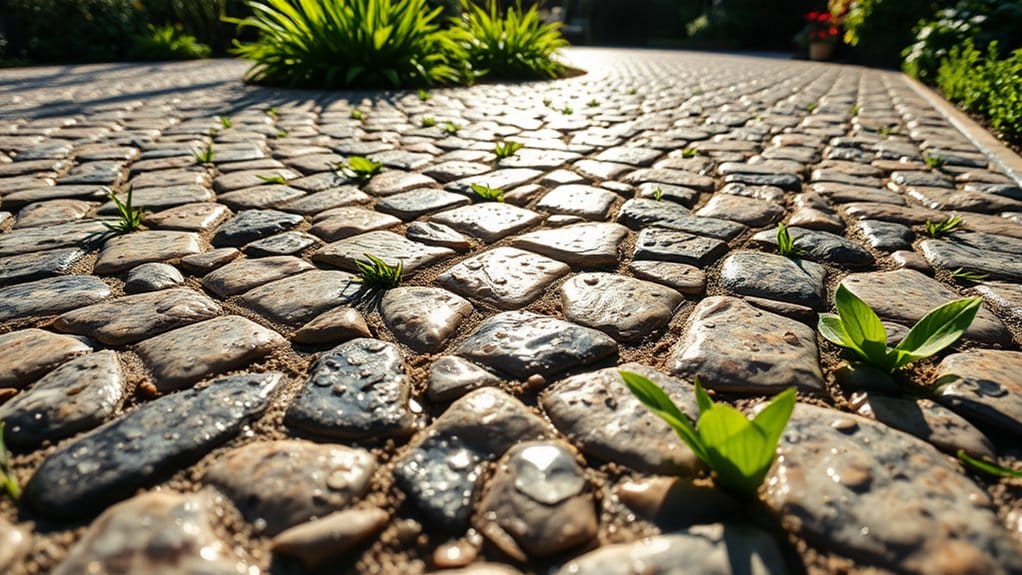
Resin driveways offer a contemporary solution for homeowners who want both practicality and style.
These driveways use a mix of resin and small aggregate stones, creating a smooth and robust surface. Common materials include gravel or crushed stone, which provide added strength. Additionally, the surface is permeable when laid on a suitable subbase, allowing for effective drainage. This type of surface is made using eco-friendly materials, further enhancing its appeal for environmentally conscious homeowners.
You can customise your driveway with various colours and textures to match your home and boost its curb appeal.
However, installation needs to be done under specific temperature and humidity conditions for the best results.
With a lifespan of over twenty years, resin driveways require minimal maintenance and are resistant to cracking and UV damage.
This makes them an excellent choice for those seeking a blend of durability and aesthetic appeal.
The Importance of Permeability in Driveways
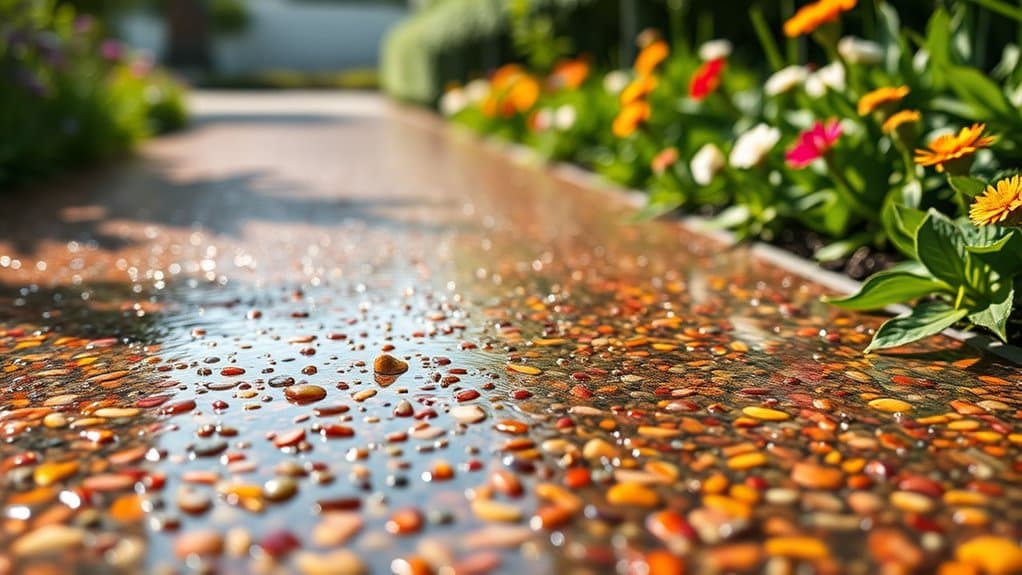
When choosing a driveway, permeability is crucial for both performance and environmental impact.
Permeable driveways, made from materials like porous concrete or resin-bound gravel, allow rainwater to seep through, helping to reduce runoff and flooding. This is particularly important in urban areas where heavy rain can overwhelm drainage systems. Using these eco-friendly materials not only aids in stormwater management and filters out pollutants, but it also recharges groundwater, benefiting local ecosystems. Additionally, permeable driveways help combat urban heat islands by keeping areas cooler. Stormwater management through the use of permeable materials ensures that rainwater is absorbed rather than diverted, further enhancing their environmental benefits. Furthermore, the combination of natural aggregates and permeable resin used in resin driveways creates a visually appealing surface that is also sustainable.
Investing in a permeable driveway isn’t only good for the environment but also cost-effective in the long run, as they require less maintenance.
Opting for permeable materials is a smart choice for anyone looking to enhance their property’s eco-friendliness.
How Resin Bound Driveways Promote Water Drainage
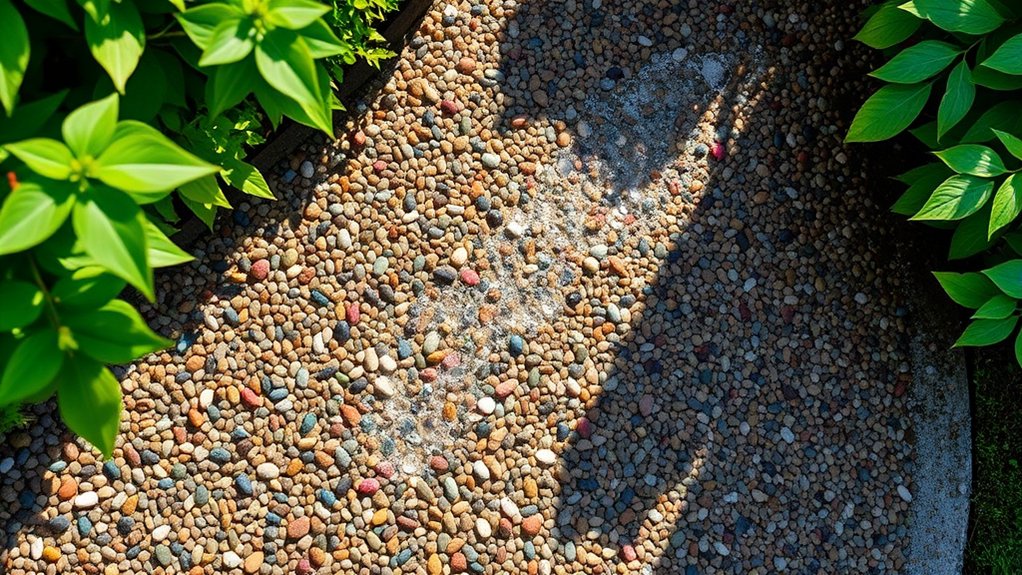
Resin bound driveways feature a clever design that allows rainwater to soak through their porous surface. This significantly cuts down on urban runoff, which is vital for managing excess water during heavy downpours. Additionally, this type of driveway supports SUDS compliance, ensuring that water is redirected back into the environment safely. Furthermore, the use of permeable materials in their construction enhances the overall effectiveness of natural water drainage.
Water Infiltration Mechanism
Permeable driveways, made from a blend of natural aggregates and clear resin, allow water to seep through their porous surface, promoting effective drainage.
This design helps rainwater penetrate the ground instead of collecting on the surface, reducing the risk of puddles and flooding. The gaps between the aggregates enhance drainage, while the resin binds them together, ensuring the surface remains durable yet permeable.
A solid base and proper installation keep the driveway smooth and functional over time. By supporting sustainable urban drainage systems, resin bound driveways aid groundwater recharge and lessen the burden on local drainage infrastructure.
Reducing Urban Runoff
Permeable surfaces, such as resin-bound driveways, tackle urban drainage issues effectively by allowing rainwater to soak in rather than pool.
In contrast to traditional asphalt and concrete, which can worsen flooding, these driveways enhance stormwater management. Their design promotes water absorption, reducing surface water and easing the strain on drainage systems during heavy rainfall.
By meeting Sustainable Urban Drainage Systems (SUDS) standards, resin-bound driveways help lessen runoff and improve water quality through natural filtration. This process not only aids groundwater recharge but also lowers erosion risks, contributing to a cleaner environment.
Opting for resin-bound driveways supports sustainable urban development while addressing urban flooding and stormwater challenges.
Environmental Benefits of Permeable Surfaces
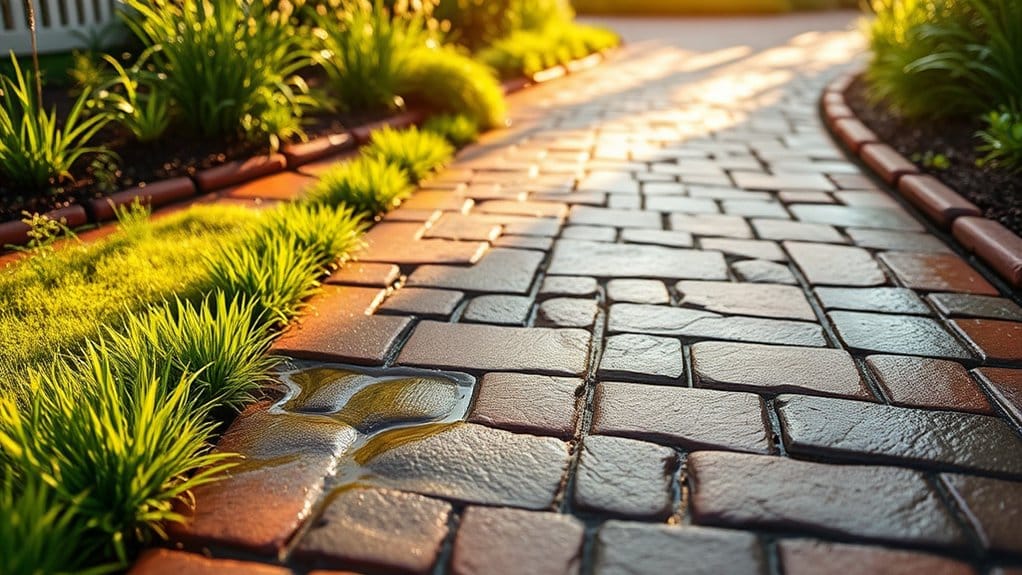
Traditional surfaces often worsen stormwater runoff and pollution, but permeable surfaces offer a sustainable alternative that benefits the environment significantly.
These surfaces manage heat effectively and help reduce pollutants. Here are some key advantages:
- They can reduce stormwater runoff by up to 80%, which helps lower flood risks.
- They naturally filter pollutants, cutting suspended solids by 94–99%.
- They mitigate urban heat island effects, keeping air temperatures cooler.
- They help decrease air pollution by reducing the need for water treatment systems.
Using permeable surfaces can lead to a cleaner and cooler urban environment.
Design Flexibility: Customizing Your Resin Driveway
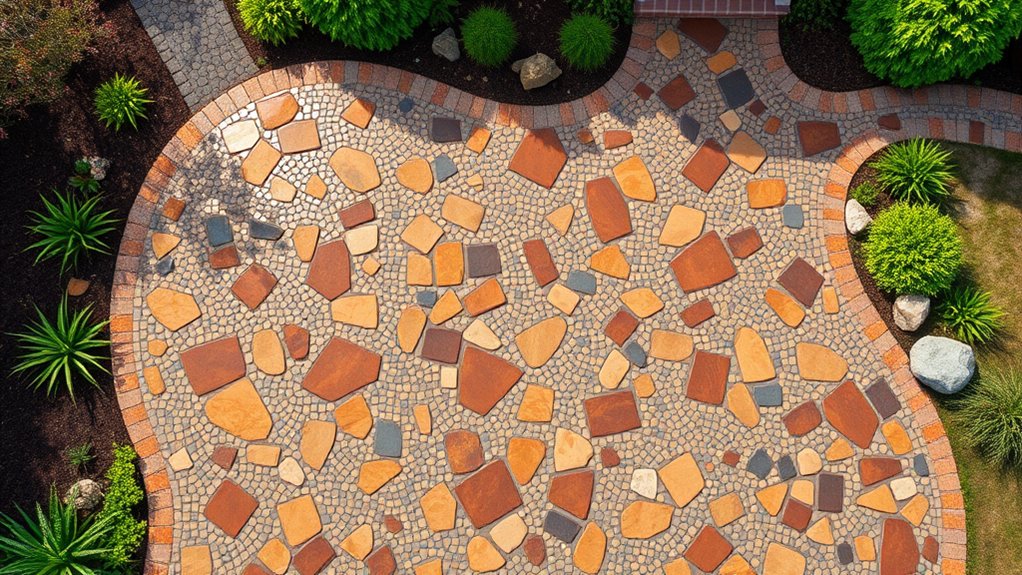
Choosing a resin driveway offers exceptional design flexibility, allowing you to create a surface that suits your style.
The resin-bound system combines resin with natural aggregates, providing a range of textures and colours to match modern trends or classic designs. You can personalise your driveway with elements like house numbers or logos for a unique touch.
The seamless surface enhances both aesthetics and traction, ensuring safety. With options for contrasting aggregates and custom designs, your driveway can harmonise with your garden or home’s architecture.
This level of customisation ensures your driveway isn’t only distinctive but also practical and long-lasting.
Installation Process and Maintenance Requirements
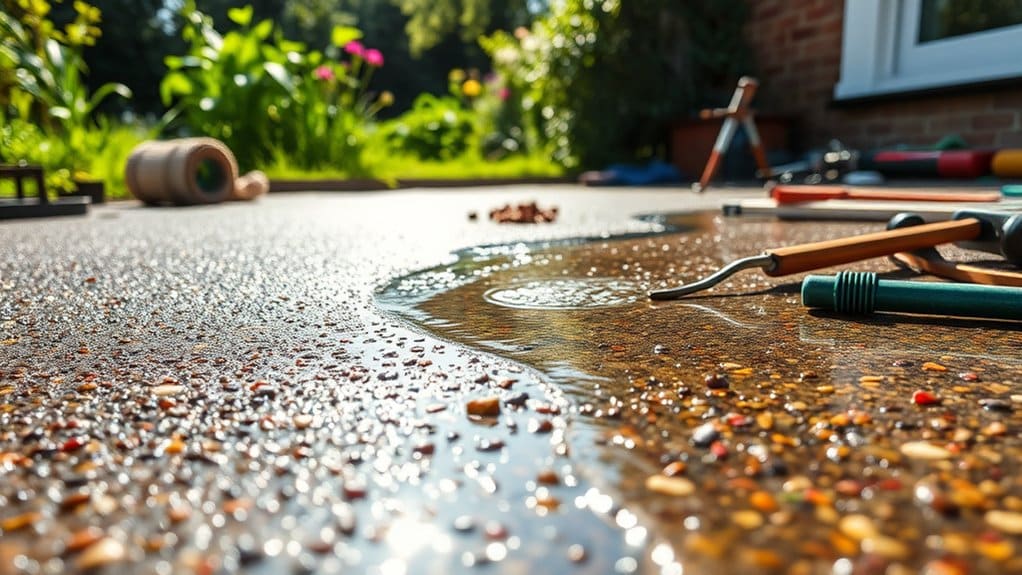
When installing a resin driveway, focus on preparing the base, mixing materials correctly, and compacting the surface to ensure optimal performance.
Maintenance is crucial too; regular cleaning and monitoring for wear can significantly prolong the driveway’s life.
Installation Steps Overview
To install a resin-bound driveway successfully, follow these essential steps to ensure durability and optimal performance.
It’s important to tackle any potential challenges, especially when choosing materials. Here’s a streamlined overview of the process:
- Clear existing surfaces and excavate to 220mm deep for stability.
- Install permeable edging and a 150mm MOT Type 3 base to facilitate proper drainage.
- Thoroughly mix resin components with aggregates to achieve a uniform consistency.
- Spread the mixture evenly and finish with a float before the resin sets.
Attention to detail in each step is crucial for achieving the best results.
Maintenance Tips and Tricks
Once you’ve installed a resin-bound driveway, it’s crucial to maintain its appearance and durability. Regular care is key to preventing damage and ensuring it lasts.
Clear away debris using a broom or leaf blower every few weeks, adjusting based on the season. For cleaning, warm soapy water works well, and a pressure washer on a low setting can help with stubborn stains.
To stop weeds and moss, lay down geotextile fabric and sweep regularly. Check for any cracks and keep a repair kit handy for quick fixes.
Comparing Resin Driveways With Other Surface Options
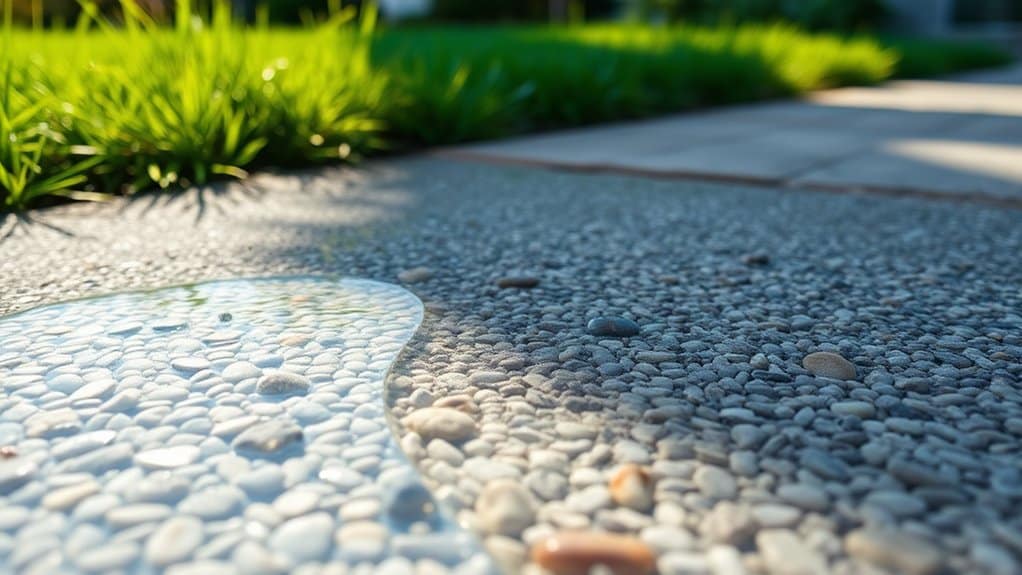
When considering driveway options, it’s important to see how resin driveways compare with other surfaces. Here’s a brief overview:
- Longevity: Resin driveways can last over 20 years with minimal maintenance.
- Aesthetic Appeal: They come in a range of designs and colours, allowing for a personalised finish.
- Eco-Friendly: Their permeable design allows water to drain, supporting groundwater recharge, unlike Tarmac and concrete.
- Maintenance: They require less upkeep than block paving and help to prevent puddles.
Taking these points into account, resin driveways are a strong contender for both functionality and style.
Their durability and design options make them an attractive choice, while their environmentally friendly features resonate with current sustainability trends.
Opting for resin means choosing a long-lasting, visually appealing, and eco-conscious surface.
Legal and Regulatory Considerations for Installation
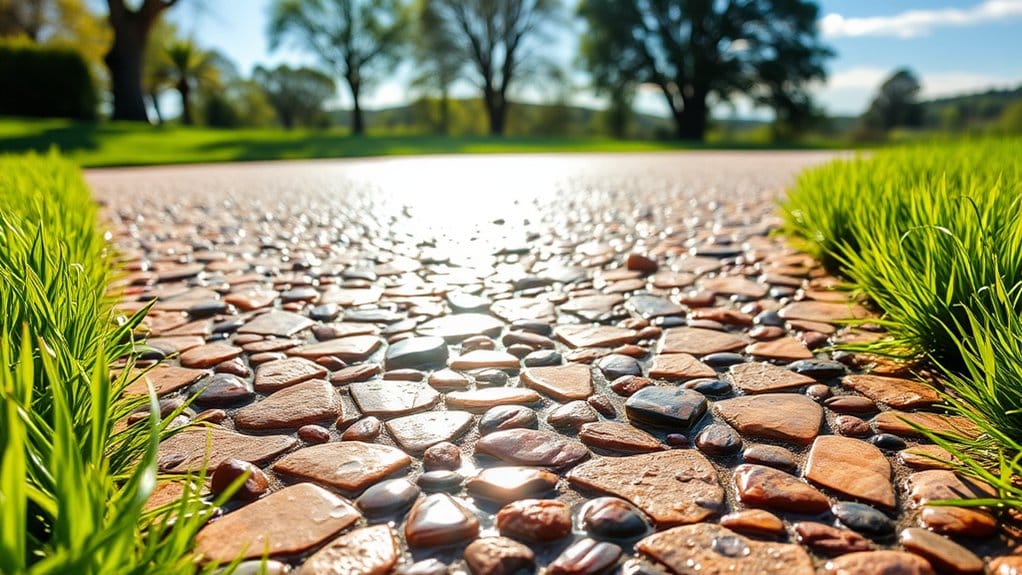
Understanding the legal and regulatory framework for resin driveway installation is crucial for property owners. You’ll need to navigate the permitting process and ensure compliance with local regulations regarding size, materials, and drainage. Here’s a concise overview of the key considerations:
| Aspect | Requirement | Importance |
|---|---|---|
| Permits | Obtain from local councils | Necessary for legal approval |
| Property Boundaries | Verify with a surveyor | Helps prevent disputes |
| Environmental Regulations | Comply with SuDS and drainage laws | Reduces environmental impact |
| Maintenance Responsibilities | Keep driveway in good condition | Prevents fines |
| Community Standards | Follow local HOA rules | Ensures neighbourhood harmony |
For example, if your driveway affects drainage in your area, you may need to implement specific solutions to comply with regulations. Always check with your local council to avoid any pitfalls.
Long-Term Cost Benefits of Resin Driveways

Navigating the legal and regulatory aspects of resin driveway installation is essential to grasping the long-term cost benefits of this choice.
- Low maintenance means lower ongoing costs.
- High durability reduces repair expenses.
- Permeability lessens the need for expensive drainage solutions.
- Eco-friendly materials can boost property value.
These elements contribute to significant cost savings over time.
With minimal upkeep and infrequent repairs, resin driveways represent a sound investment.
Their ability to manage water runoff means you won’t need to worry about additional drainage systems, cutting down on installation and maintenance costs.
The robustness of resin-bound surfaces translates to fewer replacements, making them a more economical choice than traditional driveways.
The Role of Resin Driveways in Sustainable Urban Development
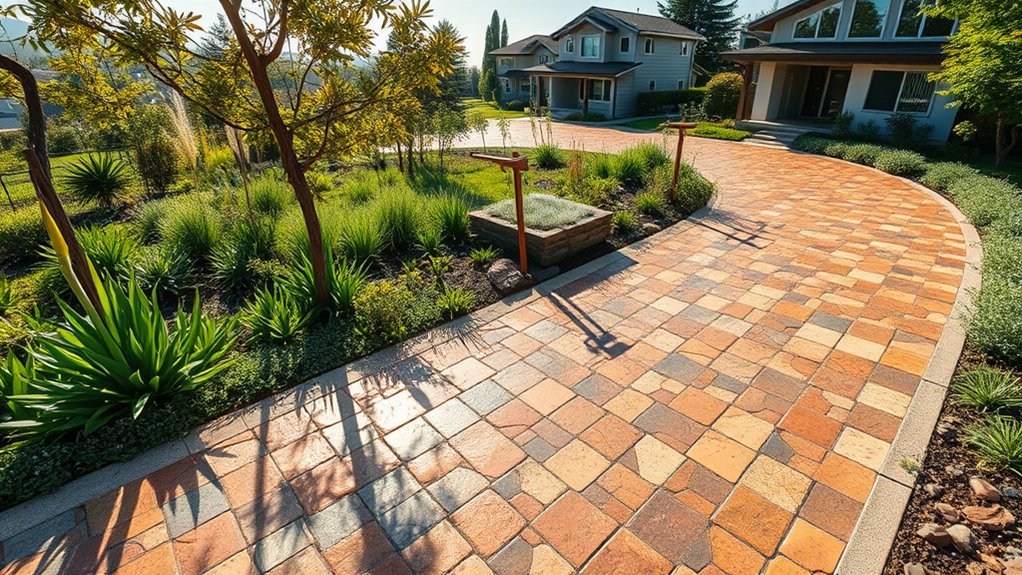
As urban areas grow, incorporating sustainable infrastructure becomes vital, and resin driveways are key to this shift.
These driveways use eco-friendly materials that enhance environmental sustainability by allowing water to permeate the surface, which helps reduce runoff. This means rainwater can soak into the ground, aiding groundwater recharge and helping to prevent flooding, thus easing the burden on drainage systems.
Resin driveways can be designed to blend with green spaces, boosting urban biodiversity and improving air quality.
They also help combat the urban heat island effect, as they reflect sunlight and absorb less heat compared to traditional surfaces.
In short, resin driveways contribute to creating multifunctional urban environments that prioritise sustainability and community involvement, aligning with modern urban development aims.
Frequently Asked Questions
Can Resin Driveways Be Installed on Sloped Surfaces?
Yes, resin driveways can be installed on sloped surfaces. It’s important to consider drainage to prevent water pooling. Specific installation techniques, like adjusting the thickness and ensuring proper surface preparation, are essential for optimal performance and longevity.
How Do Resin Driveways Handle Extreme Weather Conditions?
Resin driveways are built to endure harsh winter conditions. They hold up well against freezing temperatures, preventing cracking and damage. This durability means your driveway remains a dependable surface, protecting your home from the elements while boosting its curb appeal.
Are There Color Options Available for Resin Driveways?
Yes, there is a vast range of colour options for resin driveways, from earthy shades to vibrant colours. This flexibility lets you personalise your driveway, improving its appearance and ensuring it matches the style of your home. For instance, you could choose a warm terracotta to complement a traditional property or a sleek grey for a modern look.
What Are the Signs of Wear on a Resin Driveway?
Signs of wear on your resin driveway include cracks, discolouration, and uneven surfaces. To avoid expensive repairs and extend its lifespan, regular maintenance is crucial. Keeping an eye on these issues will help maintain both the functionality and appearance of your driveway.
How Long Does the Installation Process Typically Take?
The installation of a resin driveway usually takes a couple of days. However, the timeline can be affected by factors such as the weather, the thickness of the layers, and the skill of the installation team. For example, rain can delay the process, while an experienced team may complete the job more efficiently.
Conclusion
When you choose a resin driveway, you’re not just making a stylish choice; you’re opting for an eco-friendly solution that aligns with nature. Its permeable design allows for efficient water drainage, helping to reduce urban flooding. Plus, it can save you money in the long run while increasing your property’s value. By selecting this innovative surface, you’re taking a step towards sustainable urban development, contributing to a greener future right outside your home.
Not sure how much a resin driveway will cost in 2025? Discover the key factors influencing pricing and installation that Read more
Wondering if you can lay a resin driveway over concrete or tarmac? Discover the essential tips for a successful installation Read more
Discover how to create a stunning DIY resin driveway with our step-by-step guide—your perfect outdoor upgrade awaits!

